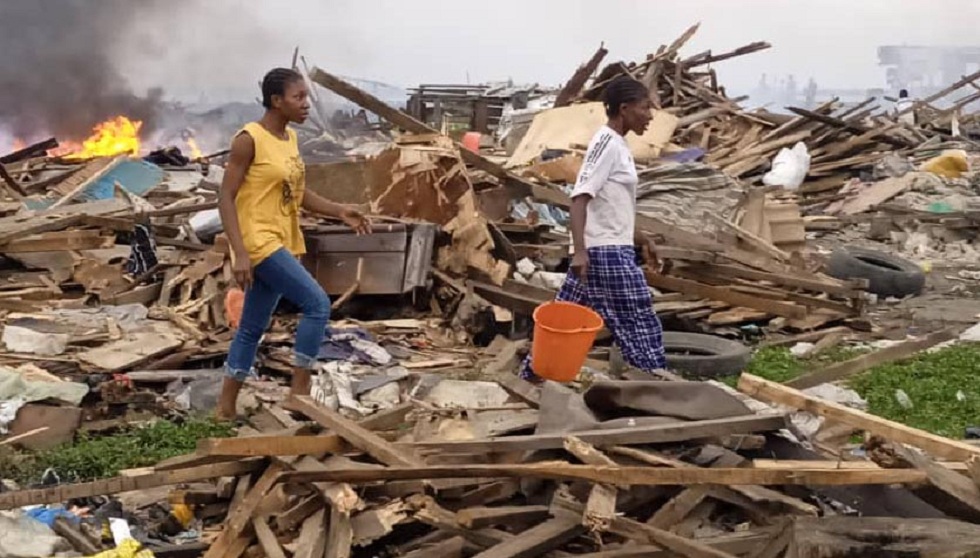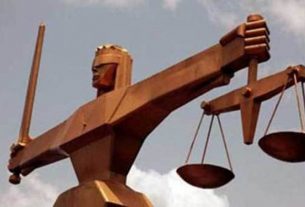The reported displacement of about 12,000 Nigerians following the recent demolition of several houses in Oke Eri, Odun-Ifa, and Precious Seed communities in Oworonshoki, Kosofe Local Area of Lagos State by the Lagos State Environment and Special Offences Enforcement Unit (Task Force) is a matter of grave concern for lovers of humanity.
It is not surprising therefore that the event has continued to generate mixed reactions. There is no doubt that the physical planning and erection of houses in that area of Lagos, as in many other areas, is warped and often needs intervention of sorts to prevent calamities. But for a government that appears to sleep over its critical duty of providing adequate housing and ensuring a befitting layout for its citizens, it is a matter of being callous and perhaps insensitive for the same government to embark on such massive demolition without first bothering about the plight of the affected people.
As initially reported, the exercise was carried out to check flooding and other environmental degradation along the riverbank. However, the demolition has displaced no fewer than 12,000 residents thereby further widening the nation’s housing deficit, which is estimated at 22 million people. Some of the affected residents alleged that they were not issued prior notice before their properties were destroyed. Hundreds, perhaps thousands of those affected are reportedly taking refuge in churches and any other available space.
As expected many of the residents had sorry tales to tell concerning their plight, with some claiming the information they had was that only make-shift structures or those buildings without adequate setbacks would be demolished; which was different from the scope of the demolition which covered other buildings.
Criticising the action of the Lagos State Government, a coalition of non-governmental organisations, namely Fabulous Urban Nigeria Foundation, Rethinking Cities, Shantytown Empowerment Foundation, CEE-Hope, Oworo Youth Forum, Lot5 Charity Foundation, Lagos Urban Development Initiative and Heinrich Boll Stiftung, stated that over 40,000 households in Oworonshoki were affected by the demolition. They further asserted that the Ministry of Environment, on July 18, 2023, had issued a single enforcement notice per community for disobeying the Environmental Management and Protection Law 2017.
They submitted that the service of a communal notice instead of personal notice is demeaning and deprives residents of their respective communities of their individual rights.
Debunking the allegations, the Public Relations Officer of the Lagos State Task Force, Mr. Abdulraheem Gbadeyan, remarked as follows: “Notice was given to them ahead of time. The reason for the demolition was because the area was a den of criminals, who rob commuters of their items on the Third Mainland Bridge.” He added that only makeshift buildings were demolished as it would be the responsibility of the Lagos State Building Control Agency to carry out the assignment if houses were involved. Wading into the matter, the Lagos State House of Assembly has ordered the Task Force to stop further demolition of houses in the Local Government Area with immediate effect. But the damage has clearly been done.
Apparently, the decision of the Lagos State Government was inspired by both environmental and security considerations, although the government only publicly acknowledged the security factor. By Sections 14(2)(b) and 20(2(b) of the 1999 Constitution, security and environmental objectives form part of the fundamentals of government.
Also, the Land Use Act, 1978 (LUA), vests the ownership of all land in the federation in the government. The government is equally empowered to revoke a Certificate of Occupancy issued on any land in the overriding interest of the public. Furthermore, while the right of Nigerians to acquire and own immovable property anywhere in the country is constitutionally protected to the extent that the government cannot compulsorily take possession of any moveable property without providing adequate compensation and complying with all other requirements of the law, however, the government can take possession of any property that is in a dangerous state or is injurious to the health of human beings, plants or animals – Section (44)(2)(f) of the 1999 Constitution. Nevertheless, it is arguable that the demolition is logically and morally justifiable, even if it is so legally. The government has a duty to protect displaced citizens, even providing alternative shelter for them in the circumstances.
The government cannot reasonably imply that the only way to rid bad eggs from society is by demolishing the properties of private individuals who have not been shown to have any connection with the commission of any crime. There is a plethora of established anti-criminal strategies for dealing with crimes without encroaching on the proprietary rights of the people. Even if the argument was that of illegal occupation of the land, there were government officials when the buildings were being erected in violation of enabling laws. The government stood by and allowed the affected residents to develop the communities only to pull down the structures several years down the line. That is a failure on its part. Had the matter been between private individuals, the Claimant would have been caught up by both the statutes of limitation and the doctrine of laches and acquiescence. Again, even houses that were not marked for demolition were also demolished, what could have informed this indiscretion?
If the allegation that the lifespan of the communal notice was just two weeks is accurate, then, the length of notice is unreasonably short given the gravity and far-reaching implications of the action intended at the material time. Also, the fact that personal notice was not served on the residents; nor were they consulted before the decision was taken indicates that the government failed to give proper notice to the residents, and by extension, the demolition is flawed. It is the constitutional right of the people to participate in the decision-making process since they are at the receiving end.
The welfare, economic, and social interests of the people also constitute the fundamental objectives of the government. To protect these rights, Section 17(2)(c)(d) of the 1999 Constitution provides that governmental actions shall be humane; that the sanctity of the human person shall be recognised and human dignity shall be maintained and enhanced by the government. To this end, the subject of demolition is insensitive, and devoid of any humanitarian consideration, especially in this time of nationwide economic adversity. Ironically, the government merely succeeded in creating another security challenge as the homeless residents are now exposed to the dangers of criminal activities.
Whilst the intervention of the Lagos State House of Assembly is acknowledged and commended, the executive arm should take immediate steps to provide housing for the already displaced residents. It bears emphasising that government exists for the common good of the people. However, there is a wide gulf between the Nigerian governments, at all levels, and the people. The ruling class has built a hedge around themselves, substantially shutting the people out of governance.
Most of their actions towards the people are oppressive. Political actors appear to be oblivious of the fact that sovereignty belongs to the people from whom they derive power. Accordingly, all tiers of government, particularly the Lagos State Government are enjoined to treat Nigerians with fairness, respect, and dignity as the people are the actual power-holders.
The Guardian





